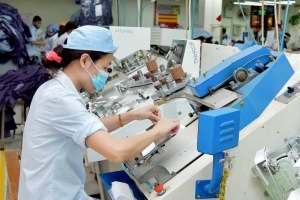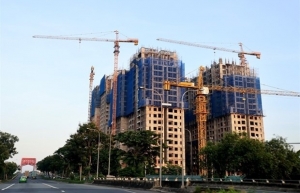Authorities ponder extension of recovery programme
 |
| Some support packages are not efficiently getting through to where it is needed most, photo Le Toan |
Next week, the National Assembly (NA) will decide if the government should continue implementing the PSRD until late next year instead of late December this year.
The PSRD is a $15 billion monetary and fiscal package, running from January 2022 to late 2023. However, cumulatively as of late September, total disbursement has reached only $4.07 billion for assisting enterprises and the public, not for public investment. The proposal was discussed at the legislature last week in Hanoi.
According to the National Assembly Economic Committee (NAEC), which has appraised the implementation of the PSRD, over the past two years, almost all support packages within the PSRD’s fiscal policy have seen slow-paced disbursement.
For example, the 2 per cent lending rate support package via the commercial bank system for enterprises, cooperatives, and household businesses has seen a very low disbursement rate – at only about $33 million or nearly 2 per cent of the assigned total of $1.69 billion.
It is expected that by late 2023, total disbursement may reach about VND1.4 trillion ($59.4 million), tantamount to only 3.5 per cent of the total. In the sectors entitled to this financial support, only 13 per cent of customers have met loan conditions – of whom two-thirds have no demand for such assistance.
“The main reasons behind the slow disbursement of this support package is that enterprises, cooperatives, and household businesses are afraid of inspections and examinations [from banks]. Besides this, to obtain loans from this package, beneficiaries must demonstrate their ‘recovery ability’ as a tough condition,” said a government report on the issue sent to the NA.
“Also, many enterprises, cooperatives, and household businesses have no demand for this type of loan as they have already benefited from preferential lending rates offered by the banks’ own loaning schemes. Furthermore, many households do not register as business and production households, so they have been unable to benefit from the package.”
“It is suggested the NA allow the government to continue implementing the 2 per cent lending rate support package until late 2024.”
According to the government report, disbursement of the PSRD’s development investment capital reached only 28.9 per cent; while loans for nurseries and non-state primary schools hit merely 10.8 per cent; and loans for ethnic minority and mountainous area development came in at 21.9 per cent.
“This situation is largely attributed to the fact that the collection and formulation of capital demands from these beneficiaries have failed to be suitable. In addition, the control of COVID-19 and the socioeconomic recovery have also led to a reduction of demand for some credit initiatives,” stated Minister of Planning and Investment Nguyen Chi Dung.
However, under the PSRD, the state budget marked for infrastructure has proved more effective, with over VND166 trillion ($7 billion) invested in 2022 and 2023 into construction expressways and large bridges. “The government would like to have permission from the NA to prolong the implementation and disbursement of the development investment capital plan of the PSRD until late 2024, and to assign the government to review and clearly determine the capital sum for the prolonged implementation and disbursement of each project, and then to report the National Assembly for consideration and determination,” read the proposal.
The NAEC has also pointed out that many other packages within the PSRD are outside expectations.
“Some support packages have had excessive money though they have ended for a long time, but the government has been slow in proposing schemes for resolution, such as the policy for supporting housing rentals for workers. Meanwhile, many other policies have big demands for capital, but resources for them remain limited,” said NAEC Chairman Vu Hong Thanh.
“The disbursement of these support packages is not feasible, meaning that the proposal and formulation of policies have not been suitable to realities, and that many procedures have become complicated, making it hard for implementation.”
The General Statistics Office last week reported that the first 10 months of the year saw 81,000 businesses with halted operations – up 22.1 per cent on-year; 50,700 enterprises stopped operations and waited for dissolution procedures – up 25.9 per cent on-year; and 14,700 enterprises completed such procedures – down 4.5 per cent on-year. On average, about 14,700 businesses left the market every month.
 | Garments and textiles sector hoping to exploit 'green' recovery Many garments and textiles firms are focussing their investment on 'greening' their production processes to position themselves for the upcoming recovery period. |
 | Realty demand gains strength amid economic recovery The real estate sector is finally emerging from its slumber as the economic recovery in the third quarter of the year has triggered a resurgence of demand for realty properties. |
 | Vietnam’s stock market and navigating the recovery phase Amid global economic flux, there is a broad consensus that US inflation is on a declining trend, albeit with some unexpected twists and turns along the way. High interest rates could yield unintended consequences, underscoring the importance of a balanced approach. |
What the stars mean:
★ Poor ★ ★ Promising ★★★ Good ★★★★ Very good ★★★★★ Exceptional
Related Contents
Latest News
More News
- Kurz Vietnam expands Gia Lai factory (February 27, 2026 | 16:37)
- SK Innovation-led consortium wins $2.3 billion LNG project in Nghe An (February 25, 2026 | 07:56)
- THACO opens $70 million manufacturing complex in Danang (February 25, 2026 | 07:54)
- Phu Quoc International Airport expansion approved to meet rising demand (February 24, 2026 | 10:00)
- Bac Giang International Logistics Centre faces land clearance barrier (February 24, 2026 | 08:00)
- Bright prospects abound in European investment (February 19, 2026 | 20:27)
- Internal strengths attest to commitment to progress (February 19, 2026 | 20:13)
- Vietnam, New Zealand seek level-up in ties (February 19, 2026 | 18:06)
- Untapped potential in relations with Indonesia (February 19, 2026 | 17:56)
- German strengths match Vietnamese aspirations (February 19, 2026 | 17:40)

 Tag:
Tag:



















 Mobile Version
Mobile Version